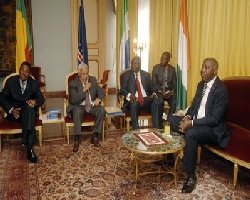A delegation of three West African presidents who met with incumbent Ivory Coast leader Laurent Gbagbo to deliver an ultimatum to step down or face force has left saying more meetings were needed.
West African presidents Boni Yayi of Benin, Ernest Bai Koroma of Sierra Leone and Pedro Pires of Cape Verde met Gbagbo on Tuesday to deliver an ultimatum from the ECOWAS regional bloc to step down as leader of the world's top cocoa grower or face removal by force.
The delegation planned to travel to Nigeria to report back to the bloc's chairman, Goodluck Jonathan.
"The chairman will negotiate a date for our return, but it would be soon," Cape Verde's president said.
The foreign minister of Gbagbo's government, Alcide Djedje, when asked about the timing of the next meeting, said it would be "around January 2."
Gbagbo's government has signaled that he is unlikely to agree to bow to international pressure and cede power to Alassane Ouattara, considered by regional and world powers to be the legitimate winner of last month's presidential election.
Meanwhile, Gbagbo' government said it would cut diplomatic ties with countries that recognize ambassadors named by Ouattara.
"The government would like to make it known that in the light of such decisions, it reserves the right to apply reciprocity in ending the missions of their ambassadors in Ivory Coast," the government's spokesman said in a statement on national television.
International intervention
Gbagbo's government originally said it would welcome the visiting leaders "as brothers and friends, and listen to the message they have to convey".
But shortly before the meeting, his government warned it would not tolerate any meddling in its affairs.
"Let's avoid political delinquency. No international institution has the right to intervene by force to impose a president in a sovereign state," Ahoua Don Melo, government spokesman, told the BBC when asked if Gbagbo would leave.
Post-election violence has killed more than 170 people and threatens to tip the country back into civil war.
In a sign of mounting tensions, a crowd attacked a United Nations convoy on Tuesday, wounding one peacekeeper with a machete and setting fire to a vehicle, according to a statement issued by the UN mission in Cote d'Ivoire.
A planned mass rally on Wednesday by the powerful pro-Gbagbo "Young Patriot" movement, led by Charles Ble Goude who is also youth minister in the Gbagbo government, was suspended to give negotiations a chance.
Fears of violence
"I think the current situation benefits no one. Let's allow for diplomacy to run its course. That's why I'm going to cancel the rally tomorrow at Place de la Republique," Ble Goude said.
Dozens of people gathered on Monday outside the Nigerian embassy in Abidjan, holding signs that read: "We don't want a military intervention" and "Let Ivoirians solve Ivoirian problems".
Nigeria has the strongest army in the region and is expected to play a major role if an operation is launched to oust Gbagbo.
Afyar Elmi, a lecturer at Qatar University in Doha, told Al Jazeera he believes Gbagbo "will step down as a result of this meeting, simply because the writing is on the wall".
He cited three supporting reasons, saying "most Ivoirians will not support Gbagbo to re-ignite the civil war, even though some of them might have supported and voted for him."
Second, according to Elmi, "the will and capacity of the international community is unanimous. There is mounting pressure from international community [on Gbagbo] to not go through with his plans."
Use of force
In a statement issued on Friday, ECOWAS had said: "In the event that Gbagbo fails to heed this immutable demand of ECOWAS, the community would be left with no alternative but to take other measures, including the use of legitimate force, to achieve the goals of the Ivoirian people."
Gbagbo has been in power since 2000 and has already overstayed his mandate by five years when the long-delayed presidential election was finally held in October.
The vote was intended to help reunify the country, which was divided by the 2002-2003 civil war into a rebel-controlled north and a loyalist south.
Instead, the election has renewed divisions that threaten to plunge the country back into civil war.
While Cote d'Ivoire was officially reunited in a 2007 peace deal, Ouattara still draws his support from the northern half of the country, where residents feel they are often treated as foreigners within their own country by southerners.
PHOTO CAPTION
West African leaders meet with Ivory Coast President Laurent Gbagbo, right, at the Presidential palace in Abidjan, Tuesday, Dec. 28, 2010.
Al-Jazeera


 Home
Home Discover Islam
Discover Islam Quran Recitations
Quran Recitations Lectures
Lectures
 Fatwa
Fatwa Articles
Articles Fiqh
Fiqh E-Books
E-Books Boys & Girls
Boys & Girls  Ramadan
Ramadan Fatwa Audios
Fatwa Audios Month of Mercy
Month of Mercy Women
Women Eed Al- Fitr
Eed Al- Fitr Food Recipes
Food Recipes Videos
Videos

 Prayer Times
Prayer Times












